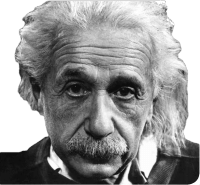19th Century People
 Once upon a time, long log ago, people had these absolute beliefs:
Once upon a time, long log ago, people had these absolute beliefs:
- We knew distances were real. If a town lay 10 miles away, it was always 10 miles away. If you walked 5 miles per hour, it would take 2 hours to reach the town. No argument.
- A clock in San Francisco would record the passage of time the same as a clock in New York. Time was fixed and unchangeable.
- The universe was big and its size was fixed. How else could it be?
- If you could see it, it was real. Nothing could be more obvious.
- Light moves in a straight line, as anyone could see when using a flashlight or spotlight.
- There was yesterday (the past), and tomorrow (the future). So obvious that no one questioned it.
- We knew we had free will, that everything we did was purely our own decision.
- Time is an absolute; the clock just keeps on ticking and always has. Time has no start or end.
And we still pretty much retain those beliefs, don’t we? Yet we’re wrong on all of them. Back in 1905, at the beginning of the 20th century, this guy Einstein started publishing his theories, starting with his Special Theory of Relativity, showing there is a relationship between space and time. Huh? Not being content with that, he continued to write articles that eluded most of us, such as his Theory of General Relativity, his Unified Field Theory and, of course, his mass-energy equivalence formula that we’ve all heard of since childhood: E=mc2.
With all this (and more), our vocabularies expanded to such terms as quantum mechanics, black holes, particle theory, dark matter, and more—yet we don’t really understand any of it, do we? Scientists do, but all we have is faith that they’re right.
Now I don’t disbelieve any of the new information. If scientists tell me that clooks run at different speeds, I’ll accept it. If told the universe is expanding, who am I to disagree? If told that what I see isn’t there, that it’s just light reflections, I’ll blink my eyes in wonderment. If they council me that yesterday and tomorrow are really the same, that will sorta’ justify some thoughts I’ve had from time to time when I’ve been puzzled.
Yet what that means is that you and I are living, from a scientific perspective, in the 19th century. Yes, us. You and I. All we managed to grasp in the recent 20th century was a snippet of electrical knowledge, radio waves (well, sorta’), computer concepts, and how to use a computer (but we still struggle with smartphones). We can quietly forget that learning to use a rotary-dial phone was complicated when first introduced, and that typewriters were an enigma to many. But we did prevail, eventually.
As I stated, this all began with Einstein. Really, now, couldn’t this have waited? I mean, just consider the facts: we were just learning how to build airplanes and make the world smaller, we had just learned how to manufacture automobiles to free the family to expand their life experiences, we had just discovered radio so we could improve communiations with others, and we finally had street lights so we could have safer streets at night. And here he goes with this knowledge that none of us can use.
That’s the core of it: we have information that we cannot use in our daily lives and the understanding of that new information remains foreign to us. Seriously, do you believe there was a time when there was no time? Face it; we’re 19th century people and so we shall remain. We may have TVs, smartphones, and microwave ovens, but that only makes us consumers. There are the scientists, and there are the rest of is. Life happens. Let’s live with it.
